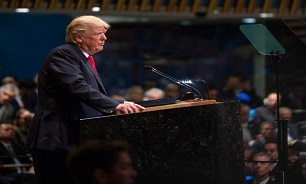When Security Council becomes insecure for Trump
 From the moment Trump started the session, he unleashed his baseless accusations against Iran. But what he did not expect was for the world to tell him point blank that their approach and policy toward Iran is different from that of the US.
From the moment Trump started the session, he unleashed his baseless accusations against Iran. But what he did not expect was for the world to tell him point blank that their approach and policy toward Iran is different from that of the US.
On Wednesday, Trump pressured members of the UN Security Council to work with Washington on supporting a new round of US sanctions on Tehran that are set to take effect on November 4.
'I ask all members of the Security Council to work with the United States to ensure the Iranian regime changes its behavior and never acquires a nuclear bomb,' Trump said.
He also threatened that 'any individual or entity who fails to comply with these sanctions will face severe consequences.'
Despite that threat, other UNSC members threw their weight behind the 2015 Iran nuclear deal, which lifted sanctions on Iran in exchange for the country curbing its nuclear program. The US backed out of the deal in May, which caused alarm among its European allies.
French President Emmanuel Macron and British Prime Minister Theresa May both defended the Iran nuclear deal, formally known as the Joint Comprehensive Plan of Action (JCPOA), as the best way of keeping Tehran away from nuclear weapons. Russia and China also strongly backed the deal.
Morales dust-up
The heaviest criticism, however, came from the Bolivian President Evo Morales who linked Trump’s actions to a broader US history of intervention in countries such as Iran.
“I would like to say to you, frankly and openly here that in no way is the United States interested in upholding democracy,” Morales said at one point. “If that were the case, it would not have financed coups d’etat and supported dictators.”
He mentioned the US-engineered 1953 coup in Iran when the democratically-elected government of Prime Minister Mohammad Mosaddeq was toppled in favor of strengthening the monarchical rule of Mohammad Reza Pahlavi.
The Bolivian leader also said that the United States was responsible for the “most egregious acts of aggression committed during the 21st century,” including the military invasion of Iraq, the military intervention in Libya and the civil war in Syria.
After Morales, it was Russian Foreign Minister Sergey Lavrov’s turn to slam the US decisions regarding Syria’s policy and JCPOA.
Russia believes that it is essential to preserve the JCPOA and we are currently working on this together with Iran, China and the European Union. Otherwise we may have to face growing tensions across the Middle East, Lavrov said.
Trump walks out
The sharp disagreement and criticism toward the US policies made Trump to leave the session he was chairing before it was over, leaving Nikki Haley – who had earlier predicted the session was going to be “the most watched Security Council meeting ever” – in charge and sparking speculation about his whereabouts among the press.
It seems that Trump was giving his seat to Haley so that she would become the fair game for the rest of the session. Haley, however, was not the person to manage the meeting or control the criticism and eventually decided to adjourn the session in her boss’s absence.
Iranian Foreign Minister Mohammad Javad Zarif, who was in New York at the time, blasted the United States for ‘abusing’ the UN Security Council session.
“The US abused the UNSC only to find itself further isolated,” Zarif wrote in a tweet, adding that “When will it learn its lesson?”
Message end/
